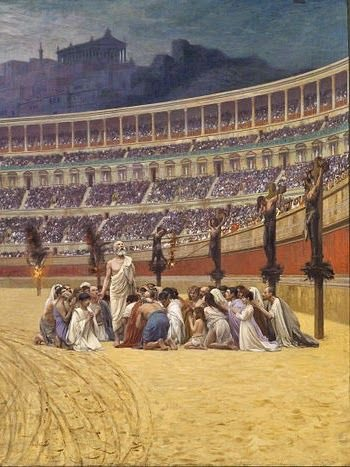Five Ancient Insights for Modern Christian Persecution
It is high time Christians rediscover their spiritual history. By doing so, we glean valuable context, learn from past mistakes, and even find helpful nuggets along the way. Stumbling we find ourselves on old, forgotten paths; but paths well-worn and leading towards the good. Brushing away the cobwebs reveals important truths about God and man. These truths help melt away modern confusion and reveal moral clarity we need.
The ancient church is a rich reservoir for us to draw from. Recently, Professor Louis Markos from Houston Christian University sat down to discuss the ancient church on the Christian Emergency Podcast. Markos, serving as our guide, unpacked several notable features of the ancient church. Here, we examine just five of them. If you’d like to enjoy our full conversation, check it out here.
Insight 1: Christians were derided as “obstinate.” Perhaps the number one reason Roman authorities clamped down on Christians: they refused to “get with the program.” From the point of view of the pagan authorities, Christians were annoying and obstinate. Rulers pulled their hair in frustration as Christians balked at seemingly mundane commands, like offering a pinch of incense to the emperor as worship. Christians were all for being good citizens, but there were lines they wouldn’t cross. Scriptural mandates – like worshiping no one besides the Lord – held real sway.
Infuriated, Roman authorities regarded this refusal as insubordination. The consequences were sometimes severe. This same response can be observed today, along a spectrum of severity. Authorities today—whether atheistic Communists, Islamic rulers or liberal progressives—do not take kindly to Christian faithfulness that obstructs their plans. Fail to toe the line, and who knows what you will see. Pink slips at work, padlocks on churches, or maybe some cheery prison bars. None of this would surprise our spiritual forebears from the ancient church.
Insight 2: The most ferocious persecutors were often not magistrates, but crowds. Sometimes this arose from religious rivals, like the Jewish synagogues in the Roman Empire. Today, similar patterns can be seen in what many call “community-based persecution.” In countries like Afghanistan or Yemen, those most likely to harm a Christian convert are those of the believer’s own family.
At other times, crowds in ancient Rome became enraged when things went wrong generally. A military campaign gone awry, poor harvests in the fields or several blocks of downtown burning—one was never sure what would set off the locals. But mobs, once whipped up, scan the landscape for someone to blame. Christians made an easy scapegoat for such crowds in ancient Rome. They still do today.
In the United States, after the Supreme Court overruled Roe v. Wade through the Dobbs decision, pro-abortion activists raged. Many took to the streets. Several churches and Christian pregnancy resource centers were attacked. This pattern recently flared more violently on the other side of the planet. In the summer of 2023, tribal tensions exploded into violence against Christians across Manipur, India. Hundreds of churches have been destroyed, tens of thousands left homeless, and scores murdered. As ancient Christians understood, mobs, not magistrates, often flash the sharpest swords.
Insight 3: Christians were vilified and falsely accused. Yep, just like the insults and slurs hurled against Christians today, believers from ancient times were likewise slandered. Christians in ancient Rome were often derided and called ugly names. For example, they were falsely accused of committing incest. After all, they called one another “brother” and “sister”—sometimes even married couples!
Believers were also branded as cannibals, since rumors swirled that they ate the body and drank the blood of Christ. Christians were even denounced as atheists, since they refused to participate in cultic emperor worship.
We can chuckle at these outlandish lies – and it is a little cathartic to do so. But we must also be willing to laugh at the lies deployed against believers today. The verbal torpedoes launched at faithful Christians are familiar; almost tired expressions at this point. “Bigot,” “hateful,” or “oppressive.” These and other barbs are simply not true. They are only meant to slime and silence. The ugly names are false on their face. Christians today would do well to remind one another that there is no truth in these ugly names. Don’t fall for the bullying tactics used by those who profess to hate bullying. Live not by lies.
Insight 4: Despite severe persecutions, Christians often fared better than others. How’s that for a surprising upside to faith under fire? Christians across the Roman Empire generally enjoyed the longest life expectancy. Why? Because they took care of their sick, their elderly, their poor and infirm. These gracious acts stood in stark contrast to the flinty pagan culture of their day. Many outsiders were ultimately converted to Christ after witnessing these selfless actions among the saints.
This is a wonderful reminder for Christians today. As society sinks around us, we always have the opportunity to care for one another. This is true for friends, families and congregations. Under the bleak skies of the Soviet Union, for example, Christian families ensured their homes were places of warmth, care and worship. They were safe harbors where their children could be raised in the love and admonition of the Lord. They were also bases from which to stage help to those struggling in their midst. Christians can fare well, even when crises hit.
Insight 5: Christians valued the vulnerable and despised, even when they were vulnerable and despised. In ancient Rome, even “good” Pagans cared little for the poor. There were no places for the destitute. They simply died in the street. This did not fly for the Christians. Believers took their faith seriously, and stood in the gap for the vulnerable.
Christians were responsible for essentially ending infanticide in Rome. Unwanted babies would be left to the elements to die, but Christians would take them into their homes and raise them with love. They showed mercy.
Christians today carry on this rich tradition. Believers played major roles in eroding the abortion industrial complex, though there is still much work to be done. They support ministries and outreach to share the Gospel with the despised and help address their needs. As culture deteriorates, there will be more and more opportunities to provide this help. Let us lean into that challenge and, with joy, continue our rich tradition.
These are only five of the insights Louis Markos raised on his recent episode of the Christian Emergency Podcast. Several other excellent points came up and are worthy of consideration as we prepare for the days ahead. If you have never listened to the Christian Emergency Podcast, you might be surprised by the range of speakers and topics covered. The show is a little treasure trove for believers around the world, providing context and encouragement we all need. This is just one more way the Christian Emergency Alliance is helping the Church stand. Soli Deo Gloria.








